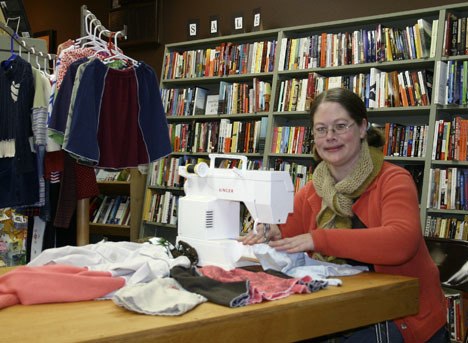At Books by the Way, owners Dave and Jenni Wilke have moved shelves, re-arranged books and placed a large table in the heart of the shop, all part of the changes taking place at Vashon’s oldest book store.
Patrons will still find books there, but they will also find “upcycled” clothing and room accessories for kids and can participate in a multitude of activities happening around that big table: projects to create and take home, classes in a variety of crafts — and even birthday parties and other celebrations.
“It may not be conventional,” Jenni said recently, “but it makes sense to us.”
Indeed, as big box bookstores continue to sell hardback books at greatly discounted prices, electronic readers such as Kindle increase in popularity and the recession lingers, many independent book sellers have gone out of business while those who have remained have had to become creative in what they offer.
For the Wilkes, this creativity has meant combining their passions, one of which centers around the textile industry and how clothes are made.
Like the Slow Food movement, which encourages people to eat food that was grown according to sound environmental and community principles, the growing “Slow Clothing” movement encourages people to purchase clothes and other textiles according to those same principles.
But buying new clothes in this way would be prohibitive for many. Take jeans, for example. If every aspect of their creation followed best practices both environmentally and for those who made them, they would cost $300, “which is, you know, crazy,” Jenni said.
And so, for the past few months, the Wilkes, who have three young children, have been selling “upcycled” clothes for kids ages 2 to 12.
The clothes are items Jenni makes from castoffs — articles that did not sell from a thrift store or were passed on to her — and that she transforms into a new item altogether.
With her sewing machine positioned on the store’s big table, striped tights can become new sleeves for a T-shirt, four different T-shirts can become a skirt, and two sweaters can have a new life as a sweater dress.
“With upcycling you can create any piece you want out of something someone does not want,” Jenni said.
The same is true for bedroom accessories. She plans to use upcycled textiles to make bedspreads, curtains, pillows and wall hangings — like a Pottery Barn, but much cheaper and environmentally friendlier.
Carrying these items seems to make good business sense to the Wilkes too, since they are in short supply on Vashon.
“I think for any store on the Island, the more they can have their own niche without overlapping what another store already does, the more chance they have of being successful,” Jenni said.
The Wilkes are applying this same philosophy to parties. Vashon parents of young children know there are few indoor options for parties here.
Last year the Wilkes donated a book-themed birthday party to the Vashon Community Care’s auction, complete with invitations, games, craft and birthday treats — an event they enjoyed hosting.
Parties also ranked high on the list when the Wilkes were thinking “what else we could do with our space and fill a need on the Island,” she said.
Because children are not the only ones who enjoy a good party, the Wilkes will rent the space for festivities for adults, too, offering up wine and appetizers in a space bibliophiles would love.
Ongoing crafts will be commonplace at the store, Wilke said. The first week of February, for instance, the store will contribute to relief efforts in Haiti. People can bring in a T-shirt or use one from the store, make a donation and silk screen an image of support for Haiti. Card-making with fabric will come soon.
The idea is not a new one, according to Jenni, who researched the store’s changes before embarking on this path. In New York City, for example, Tracey Stewart, wife of the Daily Show’s Jon Stewart, runs the Moomah Café, where there is a weekly craft that even the very young can do.
The same will be true at Books by the Way, Jenni said. “Everything will be for kids and adults.”
With the recession lingering, this is actually a good time to make changes, she said. “It’s not like we are going to lose business.”
New book stores operate on a very thin profit margin, Jenni added, which in a good year is only 1 to 2 percent. When times get tough, there is very little margin to serve as a buffer, and when the recession hit, the Wilkes felt it immediately.
“You could make a graph and chart it,” she said. “I have not paid myself in a year.”
Still, the Wilkes, who continue to get shipments of new books every week, say the changes are completely in line with their hopes when they bought the store in November 2007.
“When we looked at buying a business, whether a restaurant, a convenience store or a bookstore, we wanted it to become a third space — not home, not work, but the other place people spend their time.”
Dave Wilke has begun a blog about the store, its changes and how they fit into a bigger picture about the textile industry and justice. (Read his blog at fairclothing.blogspot.com.)
“Our vision is a store and space that is a true resource for mind, body, and soul,” he said.
Jenni Wilke agreed, noting the response so far has been good.
“Most of our regular customers have been very positive about what we’re doing, and it seems to make sense to them,” she said.



